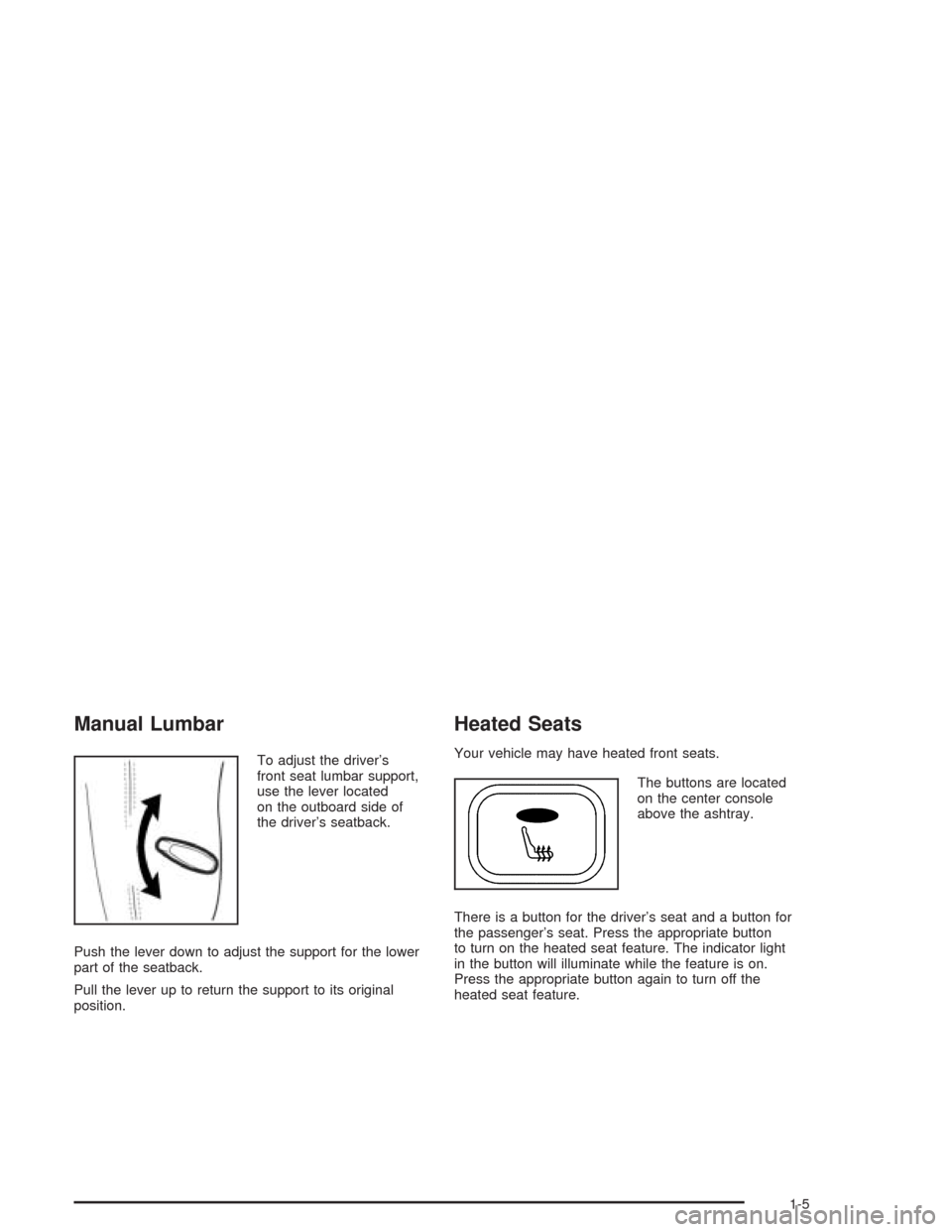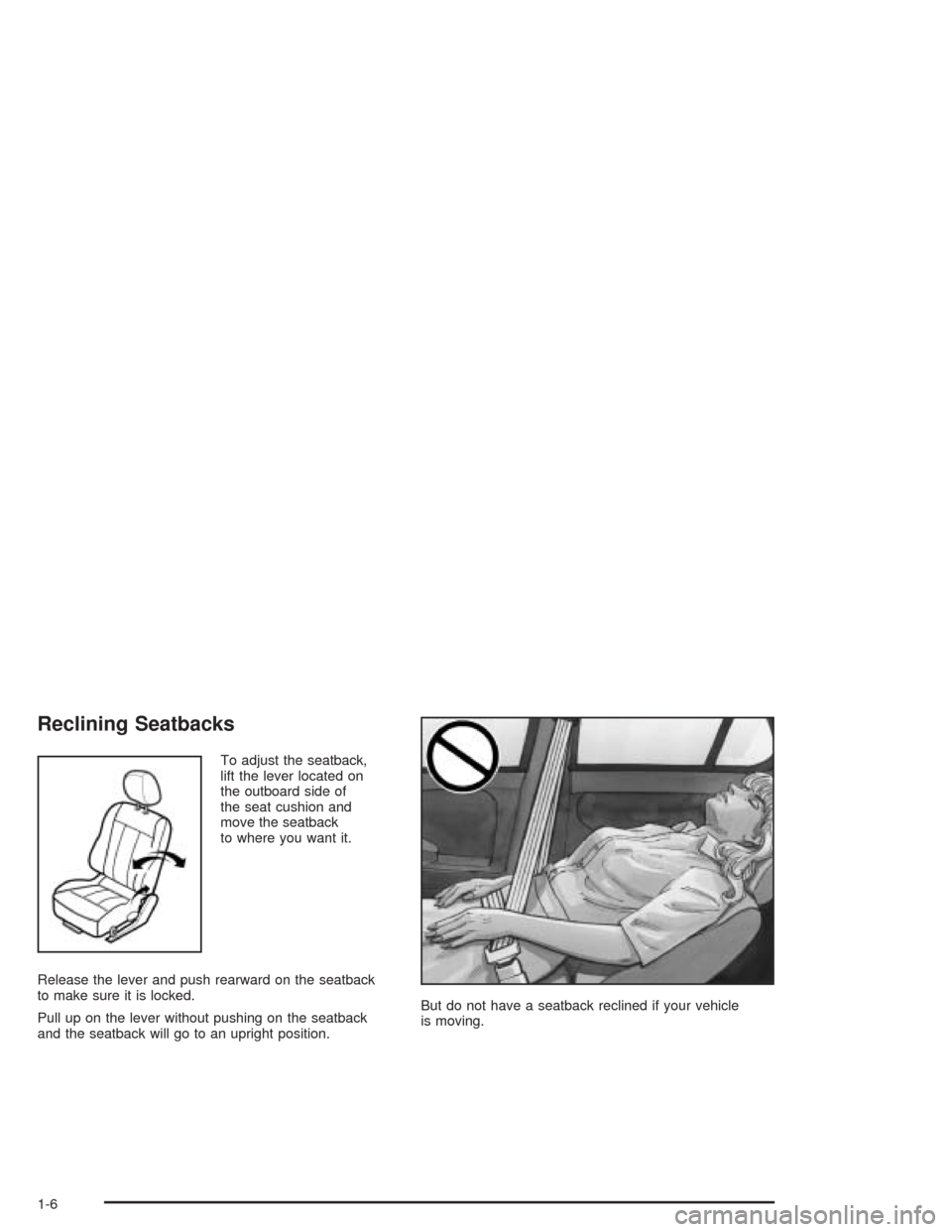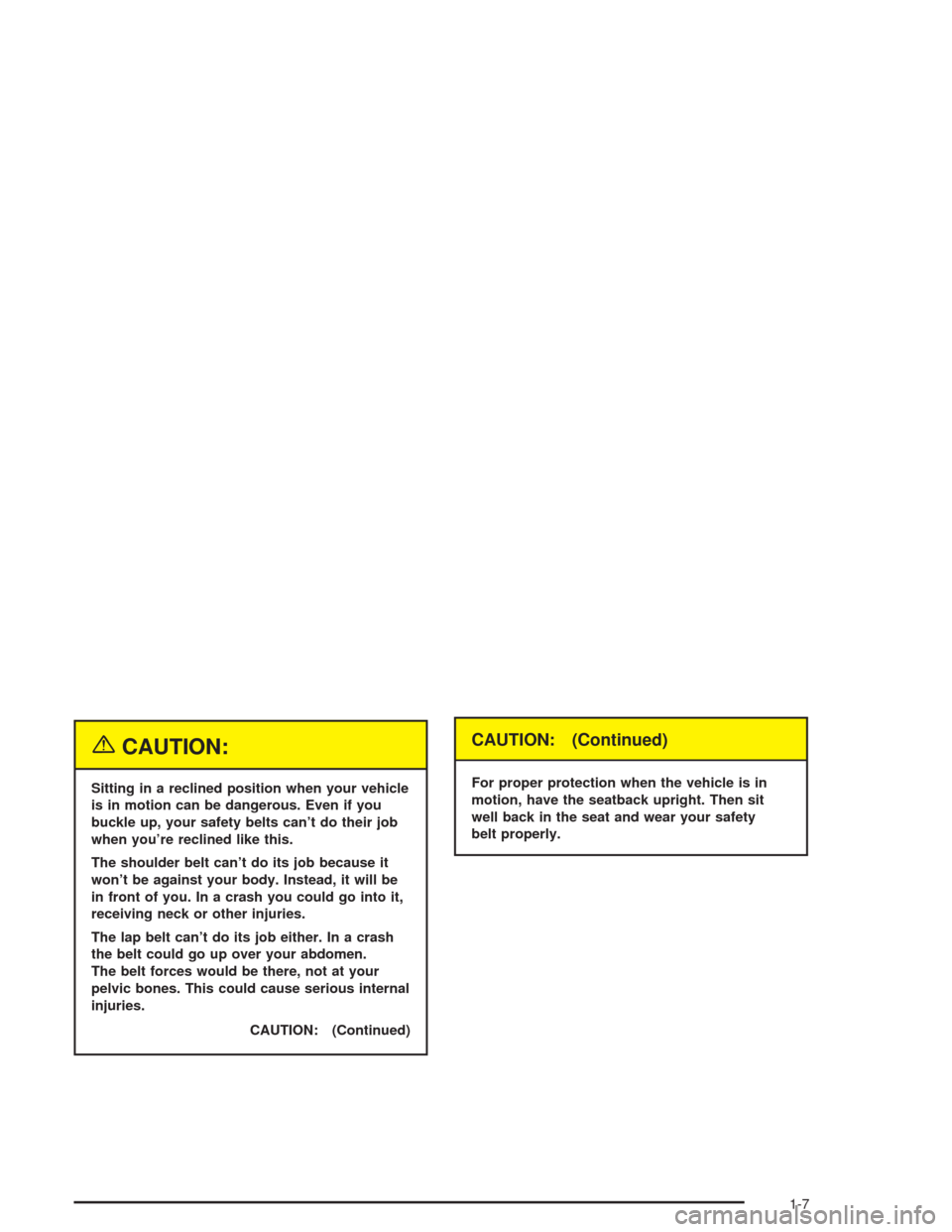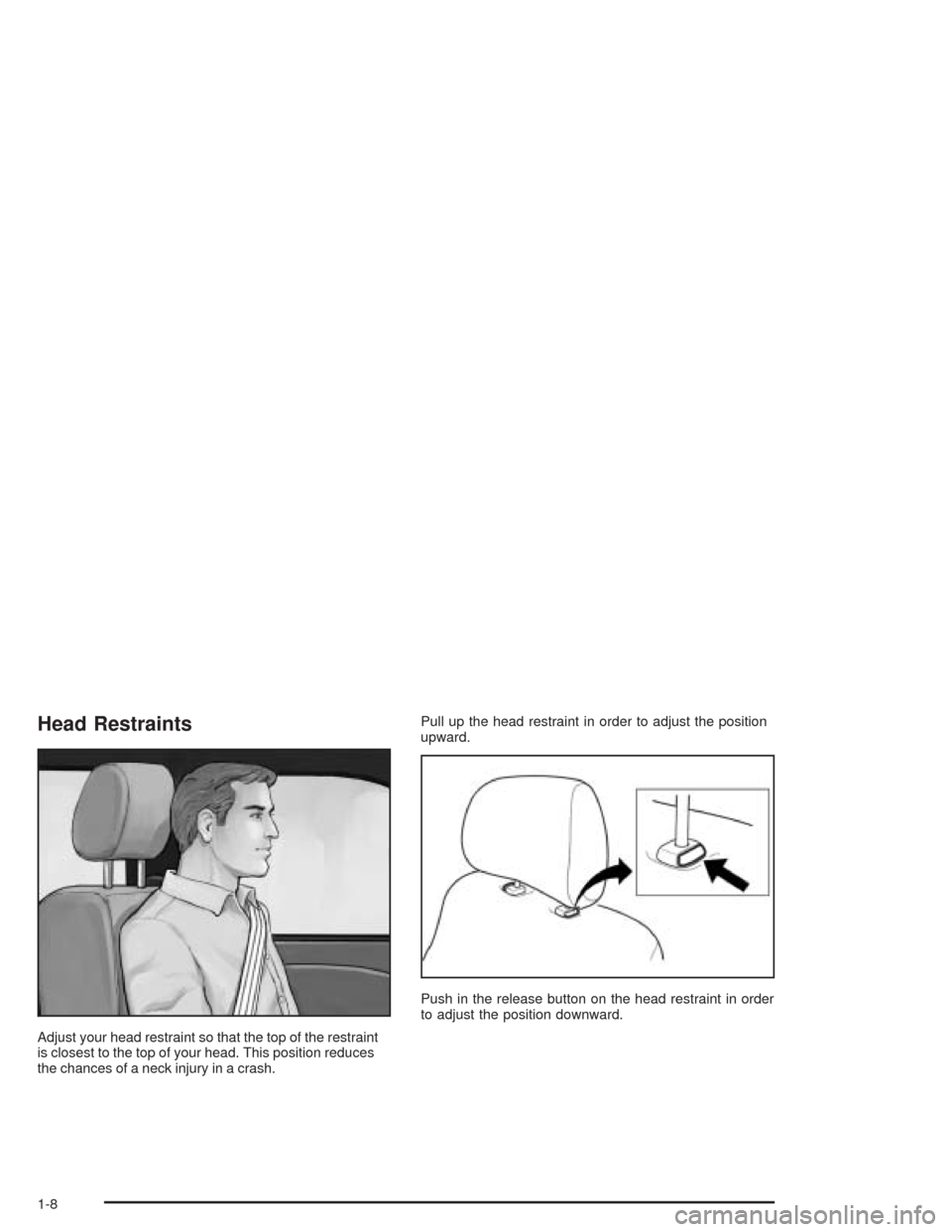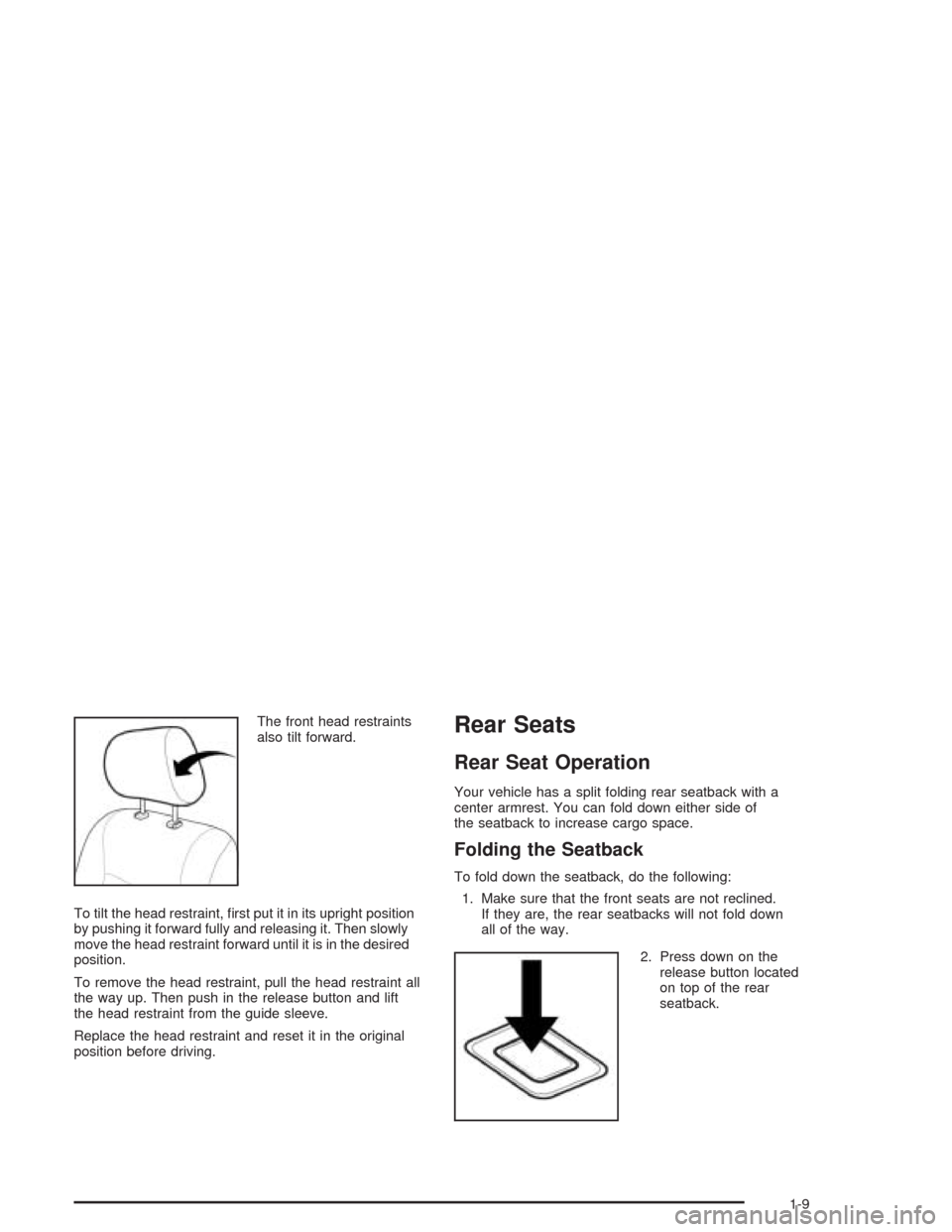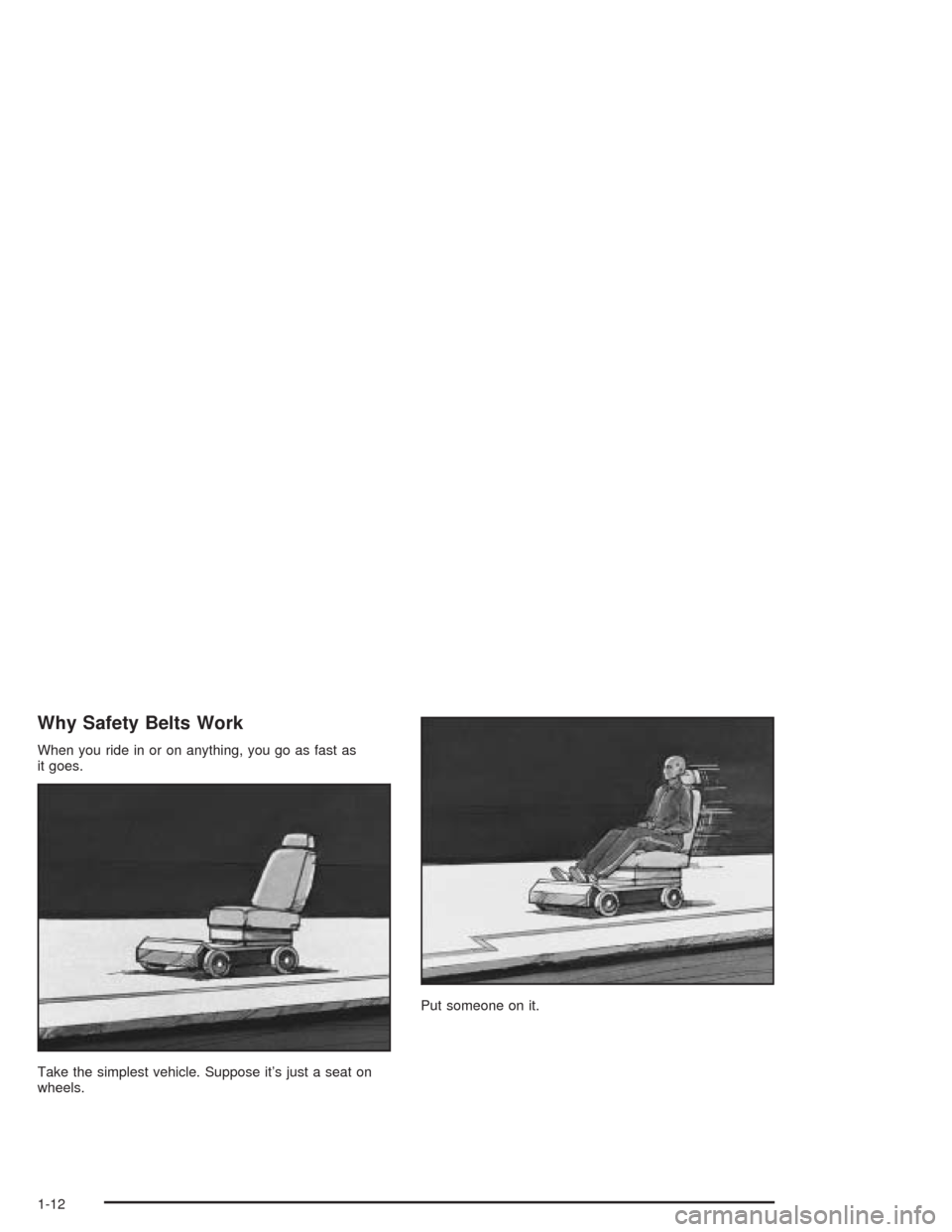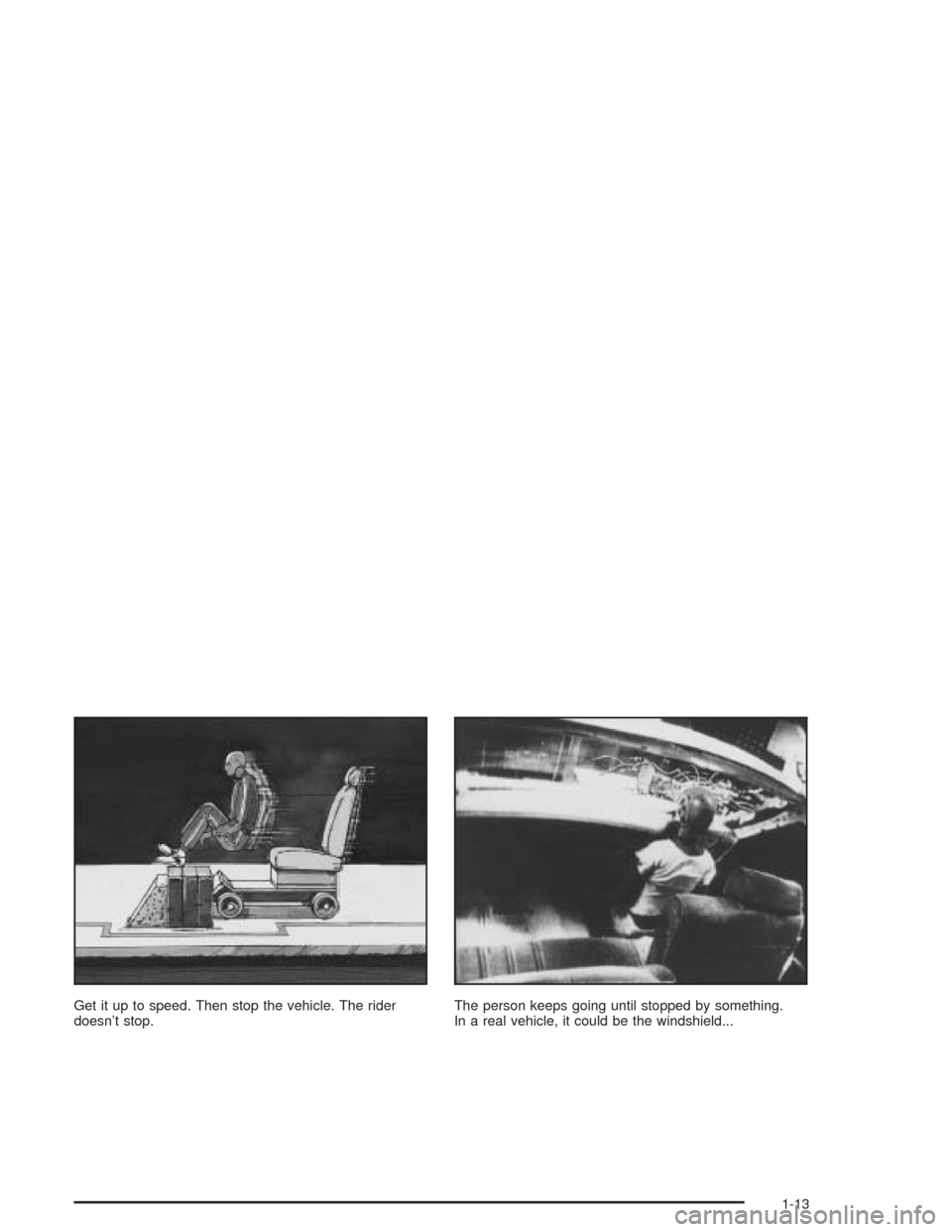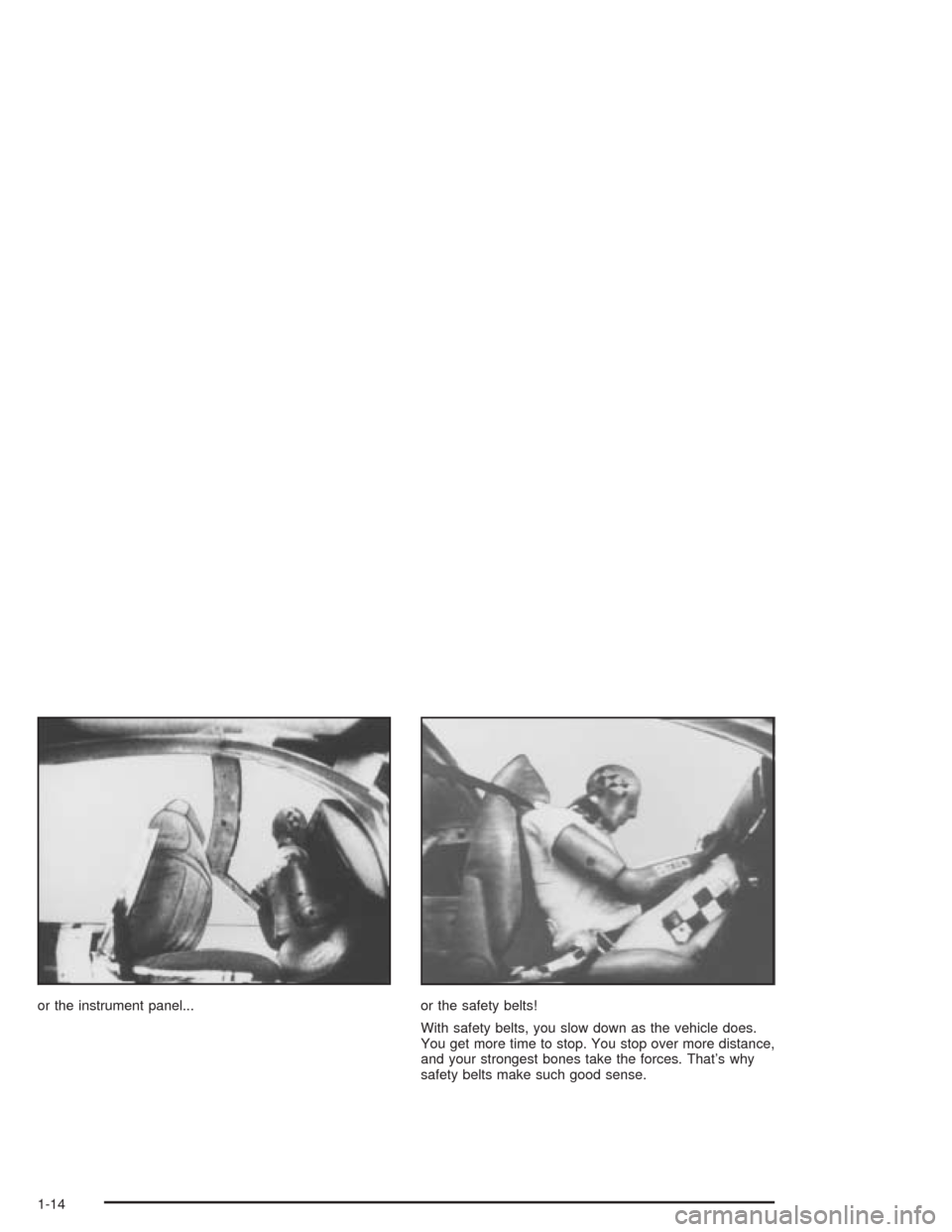CHEVROLET EPICA 2004 1.G User Guide
EPICA 2004 1.G
CHEVROLET
CHEVROLET
https://www.carmanualsonline.info/img/24/8142/w960_8142-0.png
CHEVROLET EPICA 2004 1.G User Guide
Trending: octane, key battery, spare wheel, coolant level, mileage, coolant temperature, fold seats
Page 11 of 338
Manual Lumbar
To adjust the driver’s
front seat lumbar support,
use the lever located
on the outboard side of
the driver’s seatback.
Push the lever down to adjust the support for the lower
part of the seatback.
Pull the lever up to return the support to its original
position.
Heated Seats
Your vehicle may have heated front seats.
The buttons are located
on the center console
above the ashtray.
There is a button for the driver’s seat and a button for
the passenger’s seat. Press the appropriate button
to turn on the heated seat feature. The indicator light
in the button will illuminate while the feature is on.
Press the appropriate button again to turn off the
heated seat feature.
1-5
Page 12 of 338
Reclining Seatbacks
To adjust the seatback,
lift the lever located on
the outboard side of
the seat cushion and
move the seatback
to where you want it.
Release the lever and push rearward on the seatback
to make sure it is locked.
Pull up on the lever without pushing on the seatback
and the seatback will go to an upright position.But do not have a seatback reclined if your vehicle
is moving.
1-6
Page 13 of 338
{CAUTION:
Sitting in a reclined position when your vehicle
is in motion can be dangerous. Even if you
buckle up, your safety belts can’t do their job
when you’re reclined like this.
The shoulder belt can’t do its job because it
won’t be against your body. Instead, it will be
in front of you. In a crash you could go into it,
receiving neck or other injuries.
The lap belt can’t do its job either. In a crash
the belt could go up over your abdomen.
The belt forces would be there, not at your
pelvic bones. This could cause serious internal
injuries.
CAUTION: (Continued)
CAUTION: (Continued)
For proper protection when the vehicle is in
motion, have the seatback upright. Then sit
well back in the seat and wear your safety
belt properly.
1-7
Page 14 of 338
Head Restraints
Adjust your head restraint so that the top of the restraint
is closest to the top of your head. This position reduces
the chances of a neck injury in a crash.Pull up the head restraint in order to adjust the position
upward.
Push in the release button on the head restraint in order
to adjust the position downward.
1-8
Page 15 of 338
The front head restraints
also tilt forward.
To tilt the head restraint, first put it in its upright position
by pushing it forward fully and releasing it. Then slowly
move the head restraint forward until it is in the desired
position.
To remove the head restraint, pull the head restraint all
the way up. Then push in the release button and lift
the head restraint from the guide sleeve.
Replace the head restraint and reset it in the original
position before driving.Rear Seats
Rear Seat Operation
Your vehicle has a split folding rear seatback with a
center armrest. You can fold down either side of
the seatback to increase cargo space.
Folding the Seatback
To fold down the seatback, do the following:
1. Make sure that the front seats are not reclined.
If they are, the rear seatbacks will not fold down
all of the way.
2. Press down on the
release button located
on top of the rear
seatback.
1-9
Page 16 of 338
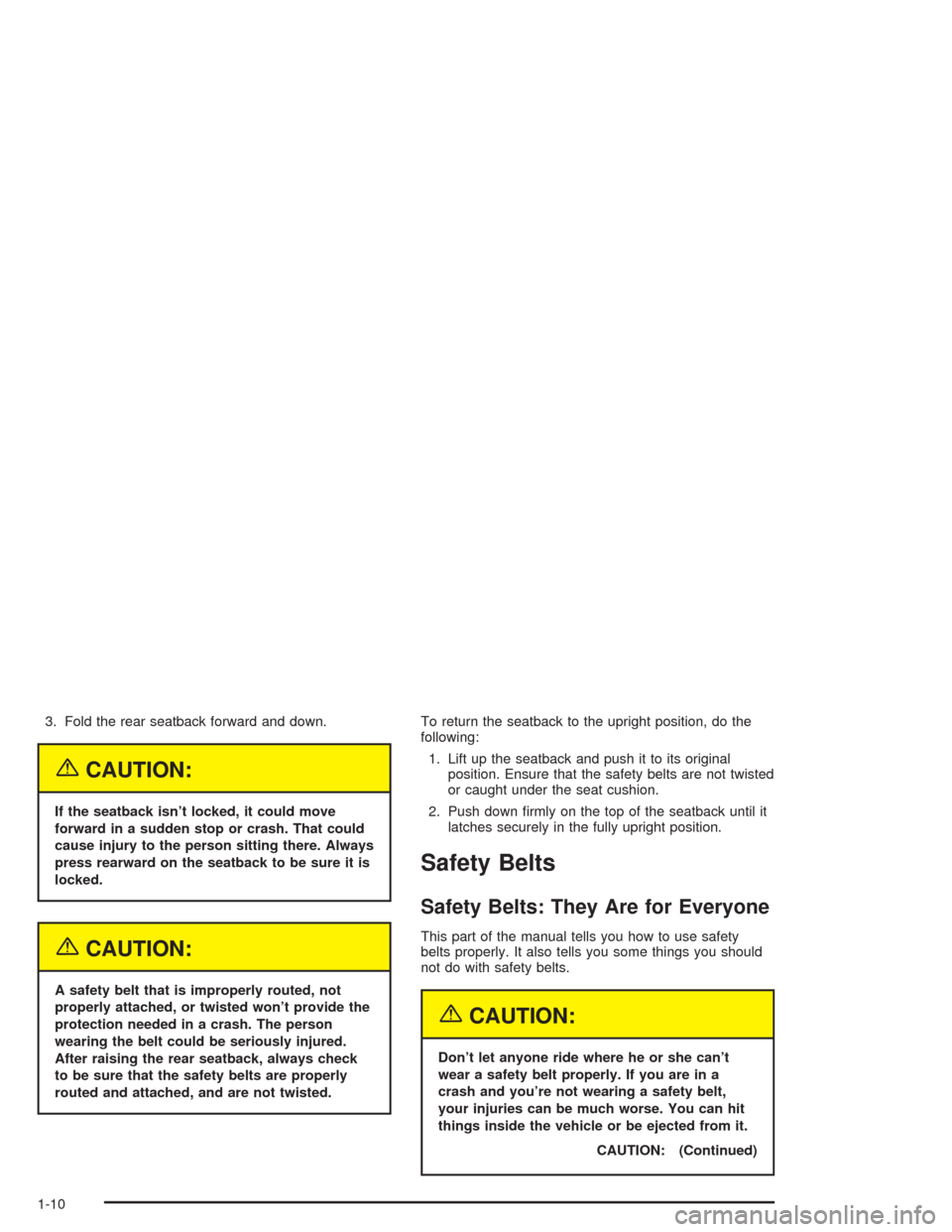
3. Fold the rear seatback forward and down.
{CAUTION:
If the seatback isn’t locked, it could move
forward in a sudden stop or crash. That could
cause injury to the person sitting there. Always
press rearward on the seatback to be sure it is
locked.
{CAUTION:
A safety belt that is improperly routed, not
properly attached, or twisted won’t provide the
protection needed in a crash. The person
wearing the belt could be seriously injured.
After raising the rear seatback, always check
to be sure that the safety belts are properly
routed and attached, and are not twisted.To return the seatback to the upright position, do the
following:
1. Lift up the seatback and push it to its original
position. Ensure that the safety belts are not twisted
or caught under the seat cushion.
2. Push down firmly on the top of the seatback until it
latches securely in the fully upright position.
Safety Belts
Safety Belts: They Are for Everyone
This part of the manual tells you how to use safety
belts properly. It also tells you some things you should
not do with safety belts.
{CAUTION:
Don’t let anyone ride where he or she can’t
wear a safety belt properly. If you are in a
crash and you’re not wearing a safety belt,
your injuries can be much worse. You can hit
things inside the vehicle or be ejected from it.
CAUTION: (Continued)
1-10
Page 17 of 338
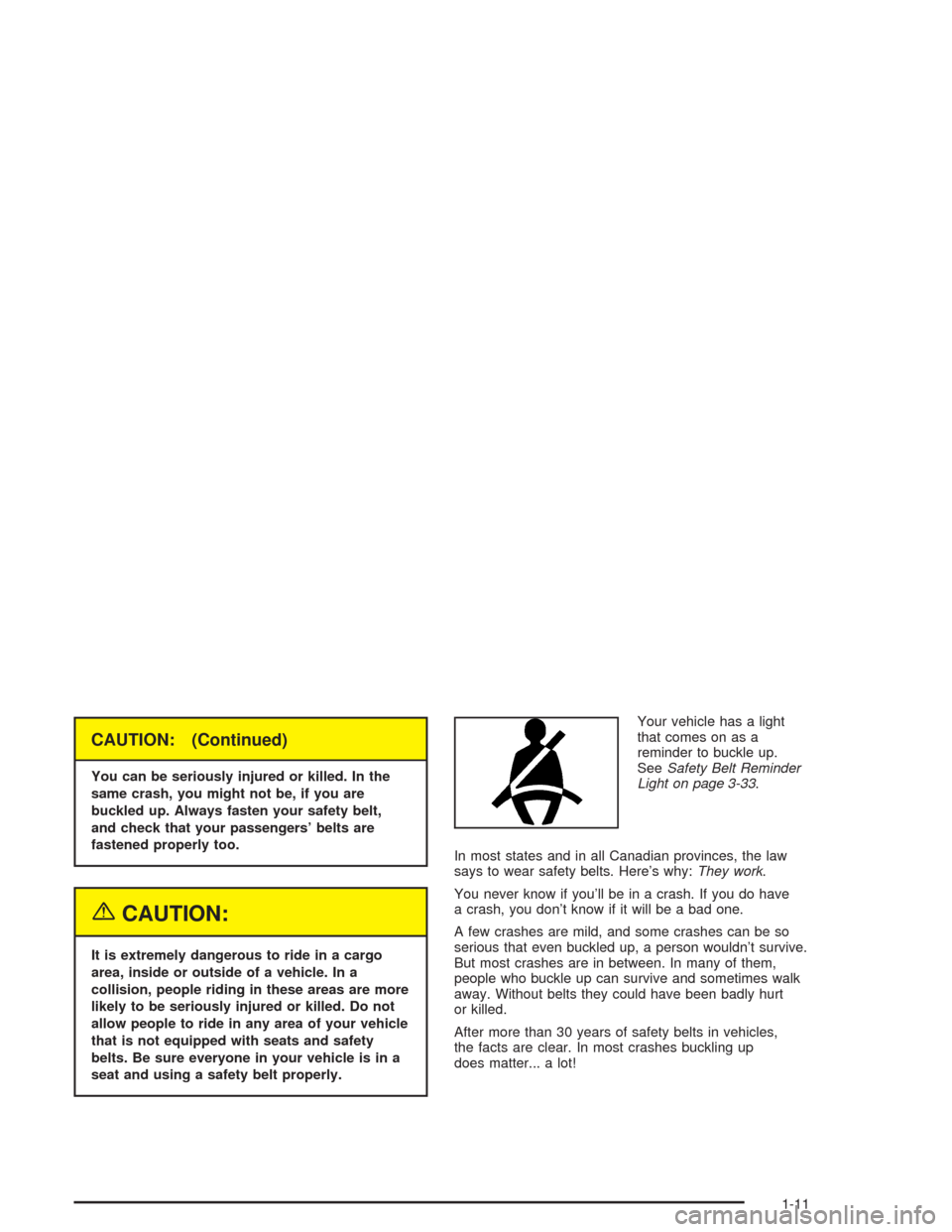
CAUTION: (Continued)
You can be seriously injured or killed. In the
same crash, you might not be, if you are
buckled up. Always fasten your safety belt,
and check that your passengers’ belts are
fastened properly too.
{CAUTION:
It is extremely dangerous to ride in a cargo
area, inside or outside of a vehicle. In a
collision, people riding in these areas are more
likely to be seriously injured or killed. Do not
allow people to ride in any area of your vehicle
that is not equipped with seats and safety
belts. Be sure everyone in your vehicle is in a
seat and using a safety belt properly.Your vehicle has a light
that comes on as a
reminder to buckle up.
SeeSafety Belt Reminder
Light on page 3-33.
In most states and in all Canadian provinces, the law
says to wear safety belts. Here’s why:They work.
You never know if you’ll be in a crash. If you do have
a crash, you don’t know if it will be a bad one.
A few crashes are mild, and some crashes can be so
serious that even buckled up, a person wouldn’t survive.
But most crashes are in between. In many of them,
people who buckle up can survive and sometimes walk
away. Without belts they could have been badly hurt
or killed.
After more than 30 years of safety belts in vehicles,
the facts are clear. In most crashes buckling up
does matter... a lot!
1-11
Page 18 of 338
Why Safety Belts Work
When you ride in or on anything, you go as fast as
it goes.
Take the simplest vehicle. Suppose it’s just a seat on
wheels.Put someone on it.
1-12
Page 19 of 338
Get it up to speed. Then stop the vehicle. The rider
doesn’t stop.The person keeps going until stopped by something.
In a real vehicle, it could be the windshield...
1-13
Page 20 of 338
or the instrument panel... or the safety belts!
With safety belts, you slow down as the vehicle does.
You get more time to stop. You stop over more distance,
and your strongest bones take the forces. That’s why
safety belts make such good sense.
1-14
Trending: wheel alignment, service reset, sport mode, fuel type, brake fluid, jump start terminals, oil filter
